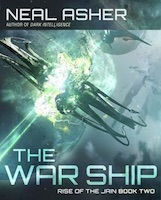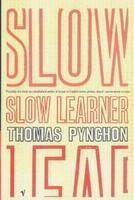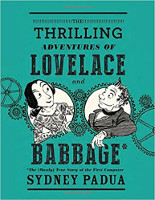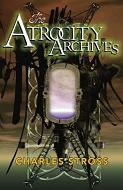 Neal Asher is an English author I've been reading for ages – and whilst his output varies both in approach, quality, and in enjoyability (now there's a relative and personal scale) I have overall rather appreciated the larger-than life escapism his books provided; including a good part of the stuff written in his Polity universe (far-future Space Opera with AIs in charge of humanity, various properly powerful aliens, huge spaceships and stations, and even bigger battles). Given that his output amounts to 24 novels plus a number of collections, novellas, short stories etc this is good going, in my book.
Neal Asher is an English author I've been reading for ages – and whilst his output varies both in approach, quality, and in enjoyability (now there's a relative and personal scale) I have overall rather appreciated the larger-than life escapism his books provided; including a good part of the stuff written in his Polity universe (far-future Space Opera with AIs in charge of humanity, various properly powerful aliens, huge spaceships and stations, and even bigger battles). Given that his output amounts to 24 novels plus a number of collections, novellas, short stories etc this is good going, in my book.
On the other hand he is one of these authors you watch with a wary eye in case some of their potentially less palatable mindsets or political leanings start coming to the fore in their writing (do I mention JKR at this point? Maybe better not...).
Still, The Warship, as middle part of a trilogy (first book The Soldier, next book – just out – The Human) is classic larger-than-life SF entertainment. It is deeply rooted in his Polity universe, is decidedly not a jumping-on point, despite the Cast of Characters & Glossary of key terms that precede the story; these mainly serve in re-acquainting the cognoscenti to the subject matter at hand! Also, the story is really not a stand-alone, but directly follows on from the events set out in The Soldier, we are straight back into the thick of the action, and the exposition and ruminations on the value of being human. See also the title of the final book in the trilogy for more thought on the matter. On a note – the trilogy is named Rise of the Jain, and it's worth noting that this has nothing to do with the religion of the name, but is (a maybe unfortunate) name of an extinct (?) historic race.
“Then we had better prepare, because we're just about to end up in a fire fight with aliens whose f'ing archaeological remains have been destroying civilisations”
We start the book with news when we are shown that Tobias, Orlandine's human lover, is involved in something – opposing her? Separatists?
But, few things are what they initially appear to be. There are shell games being played aplenty, and most major characters have ulterior motives, drives, and things they are driving below the surface. And so we see the Clade arrive and muck in, even if it's rather unclear on whose behalf or benefit (not necessarily the same thing here), or even to what end.
Still, for a middle-of-trilogy book this does not behave as such – instead of the traditional story development and low event density 'hanger' we are thrown into the thick of the action – within the first 100 pages we have Dragon badly damaged, but helping Cog (disabled) and Blade (in pieces!). Orlandine is down and on the run. Orlik is now captain's the Kinghammer, ie the Prador King's principal ship, with his Polity War Drone trophy as AI. The Clade appear to work for the Wheel, who/whatever this is; and the Cable Hogue is just wading into the action.
Much whiplash from a crash start, anyone?
Not that we only get action, mind, else we'd be in the slightly brainless, 1-dimensional storytelling of Prador Moon. We get quite some background in-between, with the info dumps frequently cleverly hidden in the story. We get more, finally, on Jaskor and the events at what is now the accretion disc from the history of the Client/Librarian, with promises of learning even more. We see development in surprising areas and characters, and with both Dragon and the Client present we now have not one but two players acting the Deus Ex Machina.
Although, having said so, we see much more of what's happening to the Client. We generally see the internal life of the protagonists (well, up to the point the author wants to show us – expect some misdirection), as always with the exception of Dragon who remains unknowable, and most of the Clade, except where individuals develop personalities before being re-absorbed into the swarm intelligence.
We also see more of the considerations and weaving around the value of humanity vs AI, and in contrast to earlier books the seems to be quite ambivalent on the value of being human here, and quite in favour of taking the next 'logical' step. But we also get examples of things lost or missed due to melding or evolving in that direction, so I'm actually looking forward to where he goes with this in the final book in the series.
I found the mix of parallels in developments, states, and well as the displayed counterpoints rather interesting; and it allows for some intricate plotting and interplay between characters. And yes, of course a lot of this is setup for the final fireworks, that's how it has to be!
The other thing I found interesting were some great displays of shifting loyalties, due to development or tactically, which together with the complex story evolving made the guesswork around the shell games played rather interesting.
Overall a rather solid piece of work, I can recommend the series from the 2/3rds point of view.
Title: The Warship
Author: Neal Asher
Series: Rise of the Jain
Series Number: 2/3
Reviewer: Markus
Reviewer URL: http://thierstein.net
Publisher: Pan McMillan
Publisher URL: http://www.panmacmillan.com
Publication Date: 2019
Review Date: 200615
ISBN: 9781509862504
Pages: 460
Format: HB
Topic: Space Opera
Topic: Precursor Civilisations













